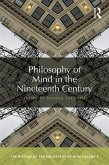Debates in Nineteenth-Century European Philosophy
Essential Readings and Contemporary Responses
Herausgeber: Gjesdal, Kristin
Debates in Nineteenth-Century European Philosophy
Essential Readings and Contemporary Responses
Herausgeber: Gjesdal, Kristin
- Gebundenes Buch
- Merkliste
- Auf die Merkliste
- Bewerten Bewerten
- Teilen
- Produkt teilen
- Produkterinnerung
- Produkterinnerung
Debates in Nineteenth-Century European & Philosophy offers an engaging and in-depth introduction to the philosophical questions raised by this rich and far reaching period in the history of philosophy. Throughout thirty chapters (organized around fifteen individual philosophers), the volume surveys the intellectual contributions of European philosophy in the Nineteenth Century, but it also engages the on-going debates about how these contributions can and should be understood. As such, the volume provides both an overview of Nineteenth-Century European philosophy and an introduction to contemporary scholarship in this field.…mehr
Andere Kunden interessierten sich auch für
![Philosophy of Mind in the Nineteenth Century Philosophy of Mind in the Nineteenth Century]() Philosophy of Mind in the Nineteenth Century168,99 €
Philosophy of Mind in the Nineteenth Century168,99 €![The Nineteenth Century The Nineteenth Century]() C.L. Ten (ed.)The Nineteenth Century61,99 €
C.L. Ten (ed.)The Nineteenth Century61,99 €![Debates in Medieval Philosophy Debates in Medieval Philosophy]() Debates in Medieval Philosophy172,99 €
Debates in Medieval Philosophy172,99 €![Debates in Modern Philosophy Debates in Modern Philosophy]() Debates in Modern Philosophy177,99 €
Debates in Modern Philosophy177,99 €![Debates in Contemporary Political Philosophy Debates in Contemporary Political Philosophy]() Derek Matravers / Jonathan Pike (eds.)Debates in Contemporary Political Philosophy191,99 €
Derek Matravers / Jonathan Pike (eds.)Debates in Contemporary Political Philosophy191,99 €![Pseudo-Philosophy at the End of the Nineteenth Century Pseudo-Philosophy at the End of the Nineteenth Century]() Hugh Mortimer CecilPseudo-Philosophy at the End of the Nineteenth Century32,99 €
Hugh Mortimer CecilPseudo-Philosophy at the End of the Nineteenth Century32,99 €![Sympathetic Realism in Nineteenth-Century British Fiction Sympathetic Realism in Nineteenth-Century British Fiction]() Rae GreinerSympathetic Realism in Nineteenth-Century British Fiction64,99 €
Rae GreinerSympathetic Realism in Nineteenth-Century British Fiction64,99 €-
-
-
Debates in Nineteenth-Century European & Philosophy offers an engaging and in-depth introduction to the philosophical questions raised by this rich and far reaching period in the history of philosophy. Throughout thirty chapters (organized around fifteen individual philosophers), the volume surveys the intellectual contributions of European philosophy in the Nineteenth Century, but it also engages the on-going debates about how these contributions can and should be understood. As such, the volume provides both an overview of Nineteenth-Century European philosophy and an introduction to contemporary scholarship in this field.
Produktdetails
- Produktdetails
- Verlag: Routledge
- Seitenzahl: 418
- Erscheinungstermin: 25. November 2015
- Englisch
- Abmessung: 235mm x 157mm x 27mm
- Gewicht: 753g
- ISBN-13: 9780415842846
- ISBN-10: 0415842840
- Artikelnr.: 41361316
- Herstellerkennzeichnung
- Libri GmbH
- Europaallee 1
- 36244 Bad Hersfeld
- gpsr@libri.de
- Verlag: Routledge
- Seitenzahl: 418
- Erscheinungstermin: 25. November 2015
- Englisch
- Abmessung: 235mm x 157mm x 27mm
- Gewicht: 753g
- ISBN-13: 9780415842846
- ISBN-10: 0415842840
- Artikelnr.: 41361316
- Herstellerkennzeichnung
- Libri GmbH
- Europaallee 1
- 36244 Bad Hersfeld
- gpsr@libri.de
Kristin Gjesdal is Associate Professor of Philosophy at Temple University. Her work covers the areas of post-Kantian philosophy (especially hermeneutics and phenomenology), aesthetics, and enlightenment thought. She is the author of Gadamer and the Legacy of German Idealism (2009) and the editor (with Michael Forster) of The Oxford Handbook to German Philosophy in the Nineteenth Century (2015).
Contributors, Editor's Introduction, I. Kantian Presuppositions. 1.The
Reception of the Critique of Pure Reason in German Idealism, by Rolf-Peter
Horstmann. 2. The Reception of the Critique of Pure Reason in German
Idealism: A Response to Rolf-Peter Horstmann, by Paul Guyer. II. Fichte
(1762-1814). 3. Fichte's Original Insight, by Dieter Henrich. 4. Fichte's
Original Insight: Dieter Henrich's Pioneering Piece Half A Century Later,
by Günter Zöller. III. Romanticism. 5. Philosophical Foundations of Early
Romanticism, by Manfred Frank. 6. Response to Manfred Frank, "Philosophical
Foundations of Early Romanticism", by Michael N. Forster. IV. Hegel
(1770-1831). 7. From Desire to Recognition: Hegel's Account of Human
Sociality, by Axel Honneth. 8. On Honneth's Interpretation of Hegel's
"Phenomenology of Self-Consciousness", by Robert B. Pippin. V. Schelling
(1775-1854). 9. The Nature of Subjectivity: The Critical and Systematic
Function of Schelling's Philosophy of Nature, by Dieter Sturma. 10. Nature
as Unconditioned? The Critical and Systematic Function of Schelling's Early
Works, by Dalia Nassar. VI. Schopenhauer (1788-1860). 11. The Real Essence
of Human Beings: Schopenhauer and the Unconscious Will, by Christopher
Janaway. 12. Emancipation from the Will, by David E. Wellbery. VII. Comte
(1798-1857). 13. Auguste Comte and Modern Epistemology, by Johan Heilbron.
14. Why Was Comte an Epistemologist?, by Robert C. Scharff. VIII. Mill
(1806-1873). 15. Mill: The Principle of Liberty, by John Rawls. 16. John
Rawls on Mill's Principle of Liberty, by John Skorupski. IX. Darwin
(1809-1882). 17. Darwin's Theory of Natural Selection and its Moral
Purpose, by Robert J. Richards. 18. Response to Richards, by Gabriel
Finkelstein. X. Kierkegaard (1813-1855). 19. Kierkegaard's On Authority and
Revelation, by Stanley Cavell. 20. A Nice Arrangement of Epigrams: Stanley
Cavell on Søren Kierkegaard, by Stephen Mulhall. XI. Marx (1818-1883). 21.
Marx's, Metacritique of Hegel: Synthesis Through Social Labor, by Jürgen
Habermas. 22. Epistemology and Self-Reflection in the Young Marx, by Espen
Hammer. XII. Dilthey (1833-1911). 23. Wilhelm Dilthey after 150 Years
(Between Romanticism and Positivism), by Hans-Georg Gadamer. 24. Gadamer on
Dilthey, by Frederick C. Beiser. XIII. Nietzsche (1844-1900). 25.
Nietzsche's Minimalist Moral Psychology, by Bernard Williams. 26.
Naturalism, Minimalism, and the Scope of Nietzsche's Philosophical
Psychology, by Paul Katsafanas. XIV. Freud (1856-1939). 27. Bad Faith and
Falsehood, by Jean-Paul Sartre. 28. Freud, by Sebastian Gardner. XV.
Twentieth-Century Developments. 29. Analytic and Conversational Philosophy,
by Richard Rorty. 30. Not Knowing What the Right Hand is Doing: Rorty's
"Ambidextrous" Analytic Redescription of Nineteenth-Century Hegelian
Philosophy, by Paul Redding. References for Republished Texts.
Reception of the Critique of Pure Reason in German Idealism, by Rolf-Peter
Horstmann. 2. The Reception of the Critique of Pure Reason in German
Idealism: A Response to Rolf-Peter Horstmann, by Paul Guyer. II. Fichte
(1762-1814). 3. Fichte's Original Insight, by Dieter Henrich. 4. Fichte's
Original Insight: Dieter Henrich's Pioneering Piece Half A Century Later,
by Günter Zöller. III. Romanticism. 5. Philosophical Foundations of Early
Romanticism, by Manfred Frank. 6. Response to Manfred Frank, "Philosophical
Foundations of Early Romanticism", by Michael N. Forster. IV. Hegel
(1770-1831). 7. From Desire to Recognition: Hegel's Account of Human
Sociality, by Axel Honneth. 8. On Honneth's Interpretation of Hegel's
"Phenomenology of Self-Consciousness", by Robert B. Pippin. V. Schelling
(1775-1854). 9. The Nature of Subjectivity: The Critical and Systematic
Function of Schelling's Philosophy of Nature, by Dieter Sturma. 10. Nature
as Unconditioned? The Critical and Systematic Function of Schelling's Early
Works, by Dalia Nassar. VI. Schopenhauer (1788-1860). 11. The Real Essence
of Human Beings: Schopenhauer and the Unconscious Will, by Christopher
Janaway. 12. Emancipation from the Will, by David E. Wellbery. VII. Comte
(1798-1857). 13. Auguste Comte and Modern Epistemology, by Johan Heilbron.
14. Why Was Comte an Epistemologist?, by Robert C. Scharff. VIII. Mill
(1806-1873). 15. Mill: The Principle of Liberty, by John Rawls. 16. John
Rawls on Mill's Principle of Liberty, by John Skorupski. IX. Darwin
(1809-1882). 17. Darwin's Theory of Natural Selection and its Moral
Purpose, by Robert J. Richards. 18. Response to Richards, by Gabriel
Finkelstein. X. Kierkegaard (1813-1855). 19. Kierkegaard's On Authority and
Revelation, by Stanley Cavell. 20. A Nice Arrangement of Epigrams: Stanley
Cavell on Søren Kierkegaard, by Stephen Mulhall. XI. Marx (1818-1883). 21.
Marx's, Metacritique of Hegel: Synthesis Through Social Labor, by Jürgen
Habermas. 22. Epistemology and Self-Reflection in the Young Marx, by Espen
Hammer. XII. Dilthey (1833-1911). 23. Wilhelm Dilthey after 150 Years
(Between Romanticism and Positivism), by Hans-Georg Gadamer. 24. Gadamer on
Dilthey, by Frederick C. Beiser. XIII. Nietzsche (1844-1900). 25.
Nietzsche's Minimalist Moral Psychology, by Bernard Williams. 26.
Naturalism, Minimalism, and the Scope of Nietzsche's Philosophical
Psychology, by Paul Katsafanas. XIV. Freud (1856-1939). 27. Bad Faith and
Falsehood, by Jean-Paul Sartre. 28. Freud, by Sebastian Gardner. XV.
Twentieth-Century Developments. 29. Analytic and Conversational Philosophy,
by Richard Rorty. 30. Not Knowing What the Right Hand is Doing: Rorty's
"Ambidextrous" Analytic Redescription of Nineteenth-Century Hegelian
Philosophy, by Paul Redding. References for Republished Texts.
Contributors, Editor's Introduction, I. Kantian Presuppositions. 1.The
Reception of the Critique of Pure Reason in German Idealism, by Rolf-Peter
Horstmann. 2. The Reception of the Critique of Pure Reason in German
Idealism: A Response to Rolf-Peter Horstmann, by Paul Guyer. II. Fichte
(1762-1814). 3. Fichte's Original Insight, by Dieter Henrich. 4. Fichte's
Original Insight: Dieter Henrich's Pioneering Piece Half A Century Later,
by Günter Zöller. III. Romanticism. 5. Philosophical Foundations of Early
Romanticism, by Manfred Frank. 6. Response to Manfred Frank, "Philosophical
Foundations of Early Romanticism", by Michael N. Forster. IV. Hegel
(1770-1831). 7. From Desire to Recognition: Hegel's Account of Human
Sociality, by Axel Honneth. 8. On Honneth's Interpretation of Hegel's
"Phenomenology of Self-Consciousness", by Robert B. Pippin. V. Schelling
(1775-1854). 9. The Nature of Subjectivity: The Critical and Systematic
Function of Schelling's Philosophy of Nature, by Dieter Sturma. 10. Nature
as Unconditioned? The Critical and Systematic Function of Schelling's Early
Works, by Dalia Nassar. VI. Schopenhauer (1788-1860). 11. The Real Essence
of Human Beings: Schopenhauer and the Unconscious Will, by Christopher
Janaway. 12. Emancipation from the Will, by David E. Wellbery. VII. Comte
(1798-1857). 13. Auguste Comte and Modern Epistemology, by Johan Heilbron.
14. Why Was Comte an Epistemologist?, by Robert C. Scharff. VIII. Mill
(1806-1873). 15. Mill: The Principle of Liberty, by John Rawls. 16. John
Rawls on Mill's Principle of Liberty, by John Skorupski. IX. Darwin
(1809-1882). 17. Darwin's Theory of Natural Selection and its Moral
Purpose, by Robert J. Richards. 18. Response to Richards, by Gabriel
Finkelstein. X. Kierkegaard (1813-1855). 19. Kierkegaard's On Authority and
Revelation, by Stanley Cavell. 20. A Nice Arrangement of Epigrams: Stanley
Cavell on Søren Kierkegaard, by Stephen Mulhall. XI. Marx (1818-1883). 21.
Marx's, Metacritique of Hegel: Synthesis Through Social Labor, by Jürgen
Habermas. 22. Epistemology and Self-Reflection in the Young Marx, by Espen
Hammer. XII. Dilthey (1833-1911). 23. Wilhelm Dilthey after 150 Years
(Between Romanticism and Positivism), by Hans-Georg Gadamer. 24. Gadamer on
Dilthey, by Frederick C. Beiser. XIII. Nietzsche (1844-1900). 25.
Nietzsche's Minimalist Moral Psychology, by Bernard Williams. 26.
Naturalism, Minimalism, and the Scope of Nietzsche's Philosophical
Psychology, by Paul Katsafanas. XIV. Freud (1856-1939). 27. Bad Faith and
Falsehood, by Jean-Paul Sartre. 28. Freud, by Sebastian Gardner. XV.
Twentieth-Century Developments. 29. Analytic and Conversational Philosophy,
by Richard Rorty. 30. Not Knowing What the Right Hand is Doing: Rorty's
"Ambidextrous" Analytic Redescription of Nineteenth-Century Hegelian
Philosophy, by Paul Redding. References for Republished Texts.
Reception of the Critique of Pure Reason in German Idealism, by Rolf-Peter
Horstmann. 2. The Reception of the Critique of Pure Reason in German
Idealism: A Response to Rolf-Peter Horstmann, by Paul Guyer. II. Fichte
(1762-1814). 3. Fichte's Original Insight, by Dieter Henrich. 4. Fichte's
Original Insight: Dieter Henrich's Pioneering Piece Half A Century Later,
by Günter Zöller. III. Romanticism. 5. Philosophical Foundations of Early
Romanticism, by Manfred Frank. 6. Response to Manfred Frank, "Philosophical
Foundations of Early Romanticism", by Michael N. Forster. IV. Hegel
(1770-1831). 7. From Desire to Recognition: Hegel's Account of Human
Sociality, by Axel Honneth. 8. On Honneth's Interpretation of Hegel's
"Phenomenology of Self-Consciousness", by Robert B. Pippin. V. Schelling
(1775-1854). 9. The Nature of Subjectivity: The Critical and Systematic
Function of Schelling's Philosophy of Nature, by Dieter Sturma. 10. Nature
as Unconditioned? The Critical and Systematic Function of Schelling's Early
Works, by Dalia Nassar. VI. Schopenhauer (1788-1860). 11. The Real Essence
of Human Beings: Schopenhauer and the Unconscious Will, by Christopher
Janaway. 12. Emancipation from the Will, by David E. Wellbery. VII. Comte
(1798-1857). 13. Auguste Comte and Modern Epistemology, by Johan Heilbron.
14. Why Was Comte an Epistemologist?, by Robert C. Scharff. VIII. Mill
(1806-1873). 15. Mill: The Principle of Liberty, by John Rawls. 16. John
Rawls on Mill's Principle of Liberty, by John Skorupski. IX. Darwin
(1809-1882). 17. Darwin's Theory of Natural Selection and its Moral
Purpose, by Robert J. Richards. 18. Response to Richards, by Gabriel
Finkelstein. X. Kierkegaard (1813-1855). 19. Kierkegaard's On Authority and
Revelation, by Stanley Cavell. 20. A Nice Arrangement of Epigrams: Stanley
Cavell on Søren Kierkegaard, by Stephen Mulhall. XI. Marx (1818-1883). 21.
Marx's, Metacritique of Hegel: Synthesis Through Social Labor, by Jürgen
Habermas. 22. Epistemology and Self-Reflection in the Young Marx, by Espen
Hammer. XII. Dilthey (1833-1911). 23. Wilhelm Dilthey after 150 Years
(Between Romanticism and Positivism), by Hans-Georg Gadamer. 24. Gadamer on
Dilthey, by Frederick C. Beiser. XIII. Nietzsche (1844-1900). 25.
Nietzsche's Minimalist Moral Psychology, by Bernard Williams. 26.
Naturalism, Minimalism, and the Scope of Nietzsche's Philosophical
Psychology, by Paul Katsafanas. XIV. Freud (1856-1939). 27. Bad Faith and
Falsehood, by Jean-Paul Sartre. 28. Freud, by Sebastian Gardner. XV.
Twentieth-Century Developments. 29. Analytic and Conversational Philosophy,
by Richard Rorty. 30. Not Knowing What the Right Hand is Doing: Rorty's
"Ambidextrous" Analytic Redescription of Nineteenth-Century Hegelian
Philosophy, by Paul Redding. References for Republished Texts.








